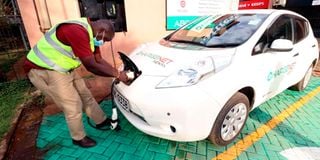Premium
NCBA launches Sh2bn electric car loan scheme

Bernard Wasike an electrical engineer at Chargenet Kenya plugs in a car at an EV charging station at ABC Place, Waiyaki Way, Westlands on September 14, 2021.
DIANA NGILA | NAIROBI
What you need to know:
- The facility which also covers both private and public service vehicles will see customers access up to 80 per cent financing for up to five years.
- The lender will charge customers 10 per cent interest on the loans on a reducing balance basis for electric vehicle loan applications received within the first 90 days.
NCBA Bank has launched a multi-billion shilling electric vehicle financing scheme for its customers to capitalise on a shift towards e-mobility.
The bank’s Group Director, Asset Finance and Business Solutions, Lennox Mugambi said the facility that also covers both private and public service vehicles will see customers access up to 80 percent financing for up to five years.
“Over a couple of months, we have received growing interest and requests from our customers who are keen to purchase electric vehicles. We see this Sh2bn investment as an opportunity to support the government establish a clean, efficient, and safe transport system that will safeguard an eco-friendly future,’’ he said.
The lender, which becomes the first bank to offer the facility, will charge customers 10 percent interest on the loans on a reducing balance basis for electric vehicle loan applications received within the first 90 days.
The turnaround time will be expected not to exceed 12 hours.
No repayment holiday
Customers will, however, not enjoy a repayment holiday in the deal that comes at a time momentum has been growing for adopting electric vehicles in Kenya as calls for clean energy solutions to reverse climate change impact get louder.
The deal is expected to boost sales of private and public service electric vehicles that were previously synonymous only with developed nations such as the US, United Kingdom, China, and Germany.
The main reason for Kenya’s slow adoption of electric vehicles is that the transition needs heavy investment in infrastructure and technology which has proved to be a tough task for many developing countries.
However, things are changing at a rather fast pace, especially here in Kenya as international electric vehicle startups enter the country in troops.
The momentum to adopt electric vehicles will only accelerate as calls for measures to curb pollution in a bid to reverse climate change impacts get louder.
In Kenya, some of the startups that have set their bases in Kenya include Opibus, Kiri, and BasiGo.
BasiGo is pioneering a new generation of eco-friendly buses that are set to reduce carbon emissions in major cities like Kisumu, Mombasa, and Nakuru. BasiGo buses will come in 25 and 36-seater capacities, with a range of about 250 kilometres, which it says is enough to cover daily round trips.
Opibus converts diesel and petrol vehicles and motorcycle engines into electric, while Kiri manufactures electric motorbikes.





